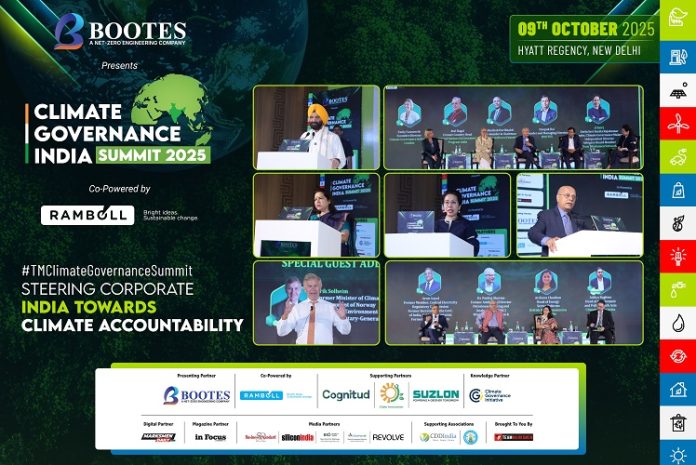India’s ascent to become a global economic power hinges on successfully decoupling growth from emissions. The crucial challenge is translating national commitments (such as the 2070 Net-Zero goal) into actionable, profitable corporate strategies, requiring unprecedented collaboration across policy, finance, and industry. The World Bank estimates that failure to implement proactive climate measures could reduce India’s GDP by up to 2.8% by 2050, underscoring the urgency for integrated governance.
Team Marksmen Network hosted its maiden edition of Climate Governance India Summit 2025 (CGIS 2025), presented by BOOTES and Co-Powered by Ramboll, which emerged as a definitive platform of addressing this critical execution gap, sparking actionable dialogues and impactful conversations on Policy, Innovation, and Sustainable Growth. Held on October 9th in New Delhi, this landmark conference gathered industry’s top brass, regulators, and distinguished policymakers, forging robust governance frameworks and ideas. With over 35+ speakers, 10+ policymakers and over 200+ delegates, the mega conference has successfully carved out a niche on actionable insights to future proof organisations and community at large.
The Summit witnessed a stellar line-up of global and national level experts congregate to tackle some of the most pressing topics on the climate agenda. Noteworthy global policymakers including Datin Seri Sunita Rajakumar, Founder of Climate Governance Malaysia; Dr. Abdullah Bilhaif Al Nuaimi, former Minister of Environment and Climate Change, UAE; Shri Manjinder Singh Sirsa, Minister of Industry, Food & Supplies and Environment, Forest and Wildlife, Government of NCT of Delhi; Erik Solheim, Former Minister of Climate and Environment, Norway & Former, Under Secretary General, United Nations & Former Executive Director, UNEP; and Meenakshi Lekhi, Former Minister of State for External Affairs, Government of India all contributed their expertise. Their insights highlighted on visionary climate leadership on the global stage and the necessary institutional reforms required for forging a strong sense of responsibility in the cultural ecosystem of climate governance.
The Guest of Honour, Manjinder Singh Sirsa, Minister of Industry, Food & Supplies and Environment, Forest and Wildlife, Government of NCT of Delhi in his speech highlighted: “Our state has a population that is more than 1.5x that of Jharkhand and Himachal. The biggest challenge is road transport, water, and the usage of energy. This is the biggest challenge to answer.”
While setting the tone of impactful conversations at the platform, the program chair, Datin Seri Sunita Rajakumar, Founder of Climate Governance Malaysia emphasized on the critical role of governance and board-level leadership in embedding sustainability into core business strategy and advancing the transition toward a resilient, low-carbon future. She stated: “India’s climate journey is not just about commitments but about creating frameworks that translate intent into impactful action. Platforms like the Climate Governance India Summit catalyse this transformation by fostering cross-sectoral dialogue and action.”
Organised under the aegis of the Climate Governance Initiative, London, the mega-conference successfully moved the discourse beyond mere pledges. focussing to embed climate risk into boardroom agendas, mobilizing green finance, and rapidly scaling up clean technology adoption. The forum served as a dynamic space for exploring actionable strategies for advancing India’s green transition, accelerating decarbonisation, and embedding sustainability into the country’s developmental fabric, championing transparent, accountable, and resilient governance to safeguard India’s economic resilience and ensure its global competitiveness in the new green economy.
Further shaping the discourse, luminaries like Ashok Lavasa, former Finance Secretary and Chief Election Commissioner; Arun Goyal, former Cabinet Secretary, Government of India & former Member, Central Electricity Regulatory Commission; and Atul Bagai, Former Country Head, United Nations Environment Program, India, deciphered the critical aspects of balancing economic stability, industrial growth, and green urbanization. Vishal Sharma, ED & CEO of Godrej Industries, explored how CEO-level commitment can scale green practices for profitability, while Emily Farnworth, Executive Director of the Climate Governance Initiative, delivered a compelling closing address on climate leadership globally.
Focussed panel discussions on the energy transition, waste-to-wealth engineering, green investments and others, have successfully outlined on the industry trends, challenges, policy gaps and promotions and way forward, providing attendees with actionable insights towards a responsible future. These deliberations underscored the need for robust collaboration between government and industry, backed by legal, financial, and institutional mechanisms that can translate climate ambition into measurable outcomes, which is paramount for meeting India’s goal of deriving 50% of its energy capacity from non-fossil fuel sources by 2030.
In his welcome address, Rajesh Khubchandani, Co-Founder and Managing Director, Team Marksmen Network, stated, “The time for policy discussion in isolation is over; we must activate the C-suite and the balance sheet. This Summit is a strategic imperative designed to transition corporate India from compliance to genuine commitment, providing the tools necessary to embed climate governance directly into the value chain.”
Eminent organizations such as BOOTES, Ramboll India, and Suzlon India participated actively, sharing their best practices and innovations driving sustainable progress across sessions that addressed decarbonisation pathways, circular economy opportunities, climate finance, and resilient urban development. Deepak Rai, Founder and Managing Director, BOOTES, quoted at the Climate Governance India Summit 2025, “India is ready to build smart, sustainable, and world-class infrastructure. And not just in metro cities, but in other cities too, like Jhansi. The next 10 years will decide if Bharat becomes a climate follower, or a climate leader.”
The Climate Governance India Summit 2025 marked a pivotal moment, successfully shifting the focus from intention to measurable implementation. By convening the most powerful stakeholders, the summit provided a clear roadmap for Indian businesses to not only navigate climate risk but to convert environmental responsibility into a core competitive advantage, aligning India’s growth story with its climate commitments, and paving the way for a greener, more resilient tomorrow.















